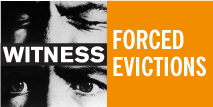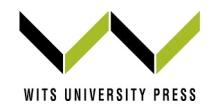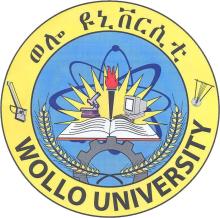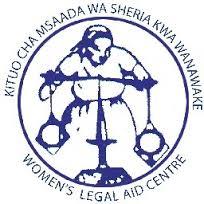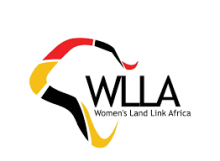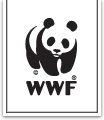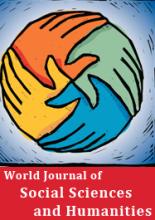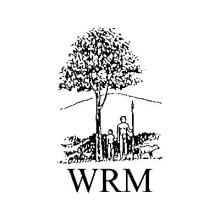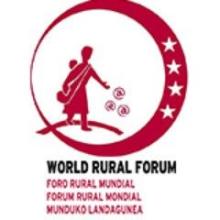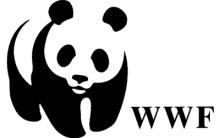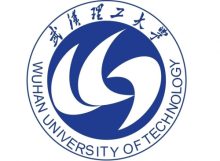The Land Library includes resources from more than 1,900 national and international information providers. Learn more about the organizations and institutions using the Land Portal to share their open-access research, data and stories.
Wilson Center
The Wilson Center, chartered by Congress in 1968 as the official memorial to President Woodrow Wilson, is the nation’s key non-partisan policy forum for tackling global issues through independent research and open dialogue to inform actionable ideas for the policy community.
The Wilson Center brings fresh thinking and deep expertise to the most pressing policy challenges we face today. We convene scholars to create a global dialogue of ideas that Congress, the administration, and the international policy community can act on. In 2019, the Wilson Center was named the #1 regional studies think tank in the world.
WITNESS Forced Evictions
15 million people are forcibly evicted each year. WITNESS works to incorporate video advocacy into local and global campaigns for housing and land rights with international and local partners in Brazil, Cambodia, Egypt, India and Mexico.
The Forced Evictions campaign ran from 2011-2014. The primary goal of the campaign was to advocate for an end to forced evictions by working with underrepresented and at-risk communities to protect their rights to housing, land, and livelihood. The campaign used video to make communities’ stories heard in the push for accountability for forced evictions resulting from development. Local campaigns illustrated trends in rural and urban communities, as well as those underlying forced evictions caused by infrastructure projects and mega-events like the World Cup and the Olympics. In partnership with the Habitat International Coalition, a global network of more than 400 organizations around the world, WITNESS supported local and national campaigns primarily in five countries—Brazil, Cambodia, Egypt, India, and Mexico.
Wits University Press
The fundamental role of any university is to promote freedom of enquiry and the search for knowledge and truth. Wits has built a reputation for itself in this role, establishing itself at the industrial and commercial heart of South Africa as a centre for education and research of the highest quality. Wits' mission is to build on this foundation in a way that takes account of its responsibilities within South Africa today; and to maintain and enhance its position as a leading university in the Republic, in Africa, and in the World by sustaining globally competitive standards of excellence in learning, teaching and research.
Wollo University
Wollo University, drawing its norms from the exemplary community that it finds itself in, cherishes unity in diversity,
respect for others and communion with all irrespective of differences.
Wollo University envisions being one of the top five Universities in terms of outstanding quality education, research, Technology transfer, and community development services in Ethiopia by 2017 E.C/ 2025 G.C
Goals
In order to meet and exceed the quality and standard requirements of students, trainees and stakeholders, the goals of Wollo University are to:
- Create a competent, motivated, adaptable, and innovative workforce for the country who can contribute to poverty reduction, social and economic development through facilitating demand-driven, high quality education and training, relevant to all sectors of the economy;
- Promote the entrepreneurial development plans of the country through incubation centers;
- Offer research-led diversified programmes that are relevant to the country;
- Prepare trainees with the necessary theoretical knowledge, attitude and skills so that they can fit for the purpose;
- Undertake problem solving researches on local, national, and international issues and problems;
- Create national and international value adding links.
Womankind Worldwide
Womankind Worldwide is a global women’s rights organisation working in solidarity and equal partnership with women’s rights organisations and movements to transform the lives of women.
Our vision is of a just world where the rights of all women are respected, valued and realised.
We work to support and strengthen women’s movements to change the world for women. Our small team is based in the UK and we work in partnership with women’s rights organisations and movements primarily in Africa and Asia. Our current focus countries are Ethiopia, Kenya, Nepal, Uganda and Zimbabwe.
We also advocate for governments and international agencies to protect and promote women’s rights through our policy and campaigns work.
Women Legal Aid Centre
A non-profit NGO that works to empower women to attain their rights and to improve vulnerable population’s access to justice across Tanzania.
OBJECTIVES:
- To provide legal aid services to women and children so as to safeguard their rights and improve their livelihoods.
- To facilitate the establishment and strengthening of paralegal units across Tanzania to foster community-based education on legal and human rights, and to improve timely access to quality legal aid.
- To lobby for change of discriminatory policies, laws and cultural practices which promote and sustain gender-based violence.
- To prepare and publish educational materials related to women and children’s rights.
- To develop and strengthen partnerships with like-minded organizations at the local, national and international level.
- To prepare informational radio and television programs and liaise with the print media on issues related to gender equality and women and children’s rights
- To prepare radio programs and liaise with the media in order to provide the masses with education about the law, gender-based violence, and human rights.
- To conduct seminars, workshops, and conferences on different topics related to women and children’s rights to different segments of the population.
VISION: A just society that respects the rights of women and children
MISSION: To promote access to justice and advocate for gender responsive policies for women and children
Women's Media Centre of Cambodia
The Women's Media Centre of Cambodia (Khmer: មណ្ឌលព័ត៌មានស្ត្រីកម្ពុជា), commonly known as WMC is a Cambodian non-governmental, non profit media organization. WMC delivers national awareness and informative programs on a diverse range of issues affecting contemporary Cambodia, with a special focus on the roles and rights of Cambodian women
Source: Wikipedia
Women’s Land Link Africa
Women's Land Link Africa (WLLA) is a joint regional partnership project that was launched in 2004. The WLLA was founded on the principal that all who are truly dedicated to improving the situation for women's land and housing rights (and to doing so in a manner which is both sustainable and stakeholder-driven) can and must link in complementary ways. The WLLA supports and strengthens linkages between regional stakeholders focused on improving women's access to, control over and ownership of land and housing in Africa. Working in isolation has rarely improved situations. In unity there is strength; in cohesiveness, the promise of real change to come. The WLLA does not re-create efforts on women's land and housing rights - rather it works to support and expand those efforts that are already successful or have the potential for success.
WLLA is part of Huairou Commission (HC) and the role of the HC within the WLLA project is to engage women-led grassroots organizations and grassroots focused non-governmental organizations into a regional network and peer-learning community focused on housing, land and property issues. WLLA project partners include the Huairou Commission (HC) and the Centre on Housing Rights and Evictions (COHRE). The twenty-one grassroots women's organizations and community-based groups located in 14 Sub-Saharan countries that are actively involved in the Women's Land Link Africa (WLLA) partnership initiative have been making great strides in their efforts to secure women's access to land and housing through community mapping, local dialogues, watchdog groups, peer exchanges and community paralegal training. The WLLA has grown exponentially in just four and a half years, from four groups in three countries in Year 1, to twenty-one groups in fourteen countries by Year 5, in 2009. The last two years in particular have seen substantial growth in the results and impacts being yielded by grassroots women's groups. In each activity undertaken, grassroots women were at the heart of the struggles, documentation and the formulation of future policies and recommendations.
Working Group for Women and Land Ownership
ABOUT
The Working Group for women and land ownership (WGWLO), is a network of 41 NGOs, CBOs and individuals in Gujarat, working on the issue of agriculture land ownership from livelihood, security, rights and empowerment angle for women. These are CBOs and NGOs spread in more than 15 districts of Gujarat, working at the rural grass roots level since 2003.
Though there are three main ways by which women can own land – inheritance, state transfers and from the market – 86% of arable land in India is privately owned. Hence a focus on private land and inheritance rights of women becomes critical. It is also essential to engage with inheritance rights in land, to ensure that land received through other sources - state transfers and from the market - do not pass on only to male heirs in the succeeding generation.
OUR OBJECTIVES
- Women's Ownership - To work to increase women's ownership of land by facilitating the proper implementation of the existing laws of the Government of Gujarat.
-
To Influence - To influence the government and the non-government agencies/persons, including the media, to help mainstream the issue of women & land ownership.
-
Undertake Advocacy - To undertake advocacy for legal reformation of the laws of the Government of Gujarat that hinder women owning land in their own name
World Agroforestry Centre
The World Agroforestry Centre (ICRAF) is a CGIAR Consortium Research Centre. ICRAF’s headquarters are in Nairobi, Kenya, with six regional offices located in Cameroon, China, India, Indonesia, Kenya and Peru.
The Centre’s vision is a rural transformation throughout the tropics as smallholder households increase their use of trees in agricultural landscapes to improve their food security, nutrition security, income, health, shelter, social cohesion, energy resources and environmental sustainability.
ICRAF's mission is to generate science-based knowledge about the diverse benefits - both direct and indirect - of agroforestry, or trees in farming systems and landscapes, and to disseminate this knowledge to develop policy options and promote policies and practices that improve livelihoods and benefit the environment.
The World Agroforestry Centre is guided by the broad development challenges pursued by the CGIAR. These include poverty alleviation that entails enhanced food security and health, improved productivity with lower environmental and social costs, and resilience in the face of climate change and other external shocks.
ICRAF's work also addresses many of the issues being tackled by the Sustainable Development Goals (SDGs) that aim to eradicate hunger, reduce poverty, provide affordable and clean energy, protect life on land and combat climate change.
World Bank Economic Review
The mission of The World Bank Economic Review is to encourage and support research in the field of development economics. We seek to publish and disseminate innovative theoretical and empirical research that identifies, analyzes, measures, and evaluates the macro and micro-economic forces that promote or impede economic development with a view towards providing the knowledge necessary for designing, implementing, and sustaining effective development policies in low and middle income countries. Our intended audience comprises a worldwide readership of economists and other social scientists in government, business, international agencies, universities, and research institutions.
World Bank Group
The World Bank is a vital source of financial and technical assistance to developing countries around the world. We are not a bank in the ordinary sense but a unique partnership to reduce poverty and support development. The World Bank Group has two ambitious goals: End extreme poverty within a generation and boost shared prosperity.
- To end extreme poverty, the Bank's goal is to decrease the percentage of people living on less than $1.25 a day to no more than 3% by 2030.
- To promote shared prosperity, the goal is to promote income growth of the bottom 40% of the population in each country.
The World Bank Group comprises five institutions managed by their member countries.
The World Bank Group and Land: Working to protect the rights of existing land users and to help secure benefits for smallholder farmers
The World Bank (IBRD and IDA) interacts primarily with governments to increase agricultural productivity, strengthen land tenure policies and improve land governance. More than 90% of the World Bank’s agriculture portfolio focuses on the productivity and access to markets by small holder farmers. Ten percent of our projects focus on the governance of land tenure.
Similarly, investments by the International Finance Corporation (IFC), the World Bank Group’s private sector arm, including those in larger scale enterprises, overwhelmingly support smallholder farmers through improved access to finance, inputs and markets, and as direct suppliers. IFC invests in environmentally and socially sustainable private enterprises in all parts of the value chain (inputs such as irrigation and fertilizers, primary production, processing, transport and storage, traders, and risk management facilities including weather/crop insurance, warehouse financing, etc
For more information, visit the World Bank Group and land and food security (https://www.worldbank.org/en/topic/agriculture/brief/land-and-food-security1
World Bank/WWF Alliance for Forest Conservation & Sustainable Use
The World Bank/WWF Alliance for Forest Conservation & Sustainable Use is a response to a crisis-the continued depletion of the world’s forest biodiversity, and of forest-based goods and services essential for sustainable development. The goal of the Alliance is a significantly reduced rate of loss and degradation of all forest types.
World Business Council for Sustainable Development
World Business Council for Sustainable Development (WBCSD) is a global, CEO-led organization of over 200 leading businesses working together to accelerate the transition to a sustainable world. We help make our member companies more successful and sustainable by focusing on the maximum positive impact for shareholders, the environment and societies. Our member companies come from all business sectors and all major economies, representing a combined revenue of more than USD $8.5 trillion and 19 million employees. Our global network of almost 70 national business councils gives our members unparalleled reach across the globe. Since 1995, WBCSD has been uniquely positioned to work with member companies along and across value chains to deliver impactful business solutions to the most challenging sustainability issues.
Together, we are the leading voice of business for sustainability: united by our vision of a world where more than 9 billion people are all living well and within the boundaries of our planet, by 2050.
World Cocoa Foundation
The World Cocoa Foundation is an international membership organization that promotes sustainability in the cocoa sector.
Who We Are
The World Cocoa Foundation (WCF) is an international membership organization that promotes sustainability in the cocoa sector. WCF provides cocoa farmers with the support they need to grow more quality cocoa and socially and economically strengthen their communities. WCF’s members include cocoa and chocolate manufacturers, processors, supply chain managers, and other companies worldwide, representing more than 80 percent of the global cocoa market. WCF’s programs benefit farmers and their communities in cocoa-growing regions of Africa, Southeast Asia, and the Americas.
WCF operates at the local and global level, bridging the needs of cocoa farmers and their families with the needs of the cocoa industry and the environment. Drawing on the strength of our members, and our partner network, we combine unique industry experience, expertise and influence to deliver the necessary social, agricultural and economic advances to promote a healthy, sustainable cocoa economy that benefits everyone from producer to consumer.
How We Work
WCF works through public-private partnerships that bring together donors, industry members, producing country governments, research institutes and non-governmental organizations to achieve its goals. The foundation is based in Washington, DC, and supports programs that benefit farmers in cocoa-growing regions of Africa, Southeast Asia and the Americas.
WCF supports programs that work with farmers at the farm level, prior to sale or commercialization of their cocoa. In this way, the programs provide farmers with the skills they need to operate productive farms and make sound business decisions.
World Economic Forum
Mission
The World Economic Forum, committed to improving the state of the world, is the International Organization for Public-Private Cooperation.
The Forum engages the foremost political, business and other leaders of society to shape global, regional and industry agendas.
It was established in 1971 as a not-for-profit foundation and is headquartered in Geneva, Switzerland. It is independent, impartial and not tied to any special interests. The Forum strives in all its efforts to demonstrate entrepreneurship in the global public interest while upholding the highest standards of governance. Moral and intellectual integrity is at the heart of everything it does.
Our activities are shaped by a unique institutional culture founded on the stakeholder theory, which asserts that an organization is accountable to all parts of society. The institution carefully blends and balances the best of many kinds of organizations, from both the public and private sectors, international organizations and academic institutions.
We believe that progress happens by bringing together people from all walks of life who have the drive and the influence to make positive change.
World Food Programme
The World Food Programme is the world's largest humanitarian agency fighting hunger worldwide.
In emergencies, we get food to where it is needed, saving the lives of victims of war, civil conflict and natural disasters. After the cause of anemergency has passed, we use food to help communities rebuild their shattered lives.
WFP is part of the United Nations system and is voluntarily funded.
Born in 1961, WFP pursues a vision of the world in which every man, woman and child has access at all times to the food needed for an active and healthy life. We work towards that vision with our sister UN agencies in Rome -- the Food and Agriculture Organization (FAO) and the International Fund for Agricultural Development (IFAD) -- as well as other government, UN and NGO partners.
On average, WFP reaches more than 80 million people with food assistance in 82 countries each year. 11,367 people work for the organization, most of them in remote areas, directly serving the hungry poor.
To learn more, watch the video outlining our mission, read our Mission Statement and our 2013 Annual Performance Report or download the Infographic.
World Forum on Access to Land 2016
The goal of the WFAL 2016 had been to organise a world forum in 2016 to address the major issues linked to unequal access to land, natural resources (see The Call). Finally, the global assembly took place in Valencia, Spain (31st March, 1-2 April 2016) with more than 400 participants from 70 countries from today at the Global Forum on Access to Land and Natural Resources.
Ten years after the World Forum on Agrarian Reforms (Valencia, Spain, 2004) and the International Conference on Agrarian Reform and Rural Development (Porto Alegre, Brazil, 2006) the trends seemed unchanged if not worse.
Making a precise assessment of the situation had been imperative. An evaluation of the short and long terms consequences had been essential. It couldn’t must ignore none of the great economical, social, political and environmental prejudices due to the ongoing processes. It was the condition to identify responses able to solve the problems.
Implementing such an analysis had been possible according to the signatories of the WFAL 2016 Call, if citizens from every continent and the organizations in charge of representing or guaranteeing their interets could effectively debate into a structured and contradictory process: farmer and other civil society organisations, governmental organisations, indepedant or public research institutes.
The WFAL 2016 Call aimed at creating the conditions necessary for such a debate, with the guarantee that each one’s point of view and analysis had been taken into consideration by all, towards the invention of the most constructive proposals.
World Journal of Social Sciences and Humanities
World Journal of Social Sciences and Humanities is a peer-reviewed, open access journal that provides rapid publication of articles in all areas of social sciences and humanities. The goal of this journal is to provide a platform for scientists and academicians all over the world to promote, share, and discuss various new issues and developments in different areas of social sciences and humanities.
World Overview of Conservation Approaches and Technologies
The World Overview of Conservation Approaches and Technologies (WOCAT) is a global Network that was established in 1992. The WOCAT Network launched efforts to compile, document, evaluate, share, disseminate, and apply sustainable land management (SLM) knowledge. It was far ahead of others in recognizing the vital importance of SLM and the pressing need for corresponding knowledge management. In early 2014, WOCAT’s growth and ongoing improvement culminated in its being officially recognized by the UNCCD as the primary recommended Global SLM Database for best practices. The work of WOCAT is guided by the WOCAT Strategy which is a product of experiences gathered in the WOCAT programme since its launch.
WOCAT played an essential role in moving away from a land degradation focus towards SLM, defining SLM and its measures. The global relevance of WOCAT is shown by the frequent use of its global SLM database, the WOCAT definitions, and the standardized WOCAT methods and tools, by various institutions and initiatives. WOCAT is widely used and referenced, so for example in the UNCCD Science-PolicyInterface (SPI) report on Sustainable Land Management contribution to successful land-based climate change adaptation and mitigation, in the IPBES assessment report on land degradation and restoration, and in the EC JRC World Atlas of Desertification for which the part on solutions was prepared in collaboration with WOCAT.
World Rainforest Movement
The World Rainforest Movement (WRM) is an international initiative that aims to contribute to struggles, reflections and political actions of forest-dependent peoples, indigenous, peasants and other communities in the global South. WRM is part of a global movement for social and environmental justice and respect for human and collective rights.
Its main role is to support struggles that defend the collective rights and self-determination of indigenous peoples and peasant communities who live in and with the forest over their territories, lives and cultures.
WRM was set up in 1986 by activists from different parts of the world in response to the ongoing destruction of forests in the global South and excessive consumption of tropical timber products in the global North. It has supported forest peoples who have been resisting the enclosure of their territories by different economic interests and extractive industries beyond timber (pulp, oil palm, minerals, dams, oil, etc), in many cases endorsed by big conservation NGOs.
From the beginning, WRM’s informal alliances with community groups, social and environmental justice organisations and social movements have been based on trust and shared political analysis of the direct and underlying drivers of forest loss and a commitment to prioritize the strengthening of community struggles in our joint work.
World Resources Institute
World Resources Institute
The World Resources Institute is a global environmental think tank that goes beyond research to put ideas into action. We work with governments, companies, and civil society to build solutions to urgent environmental challenges. WRI’s transformative ideas protect the earth and promote development because sustainability is essential to meeting human needs and fulfilling human aspirations in the future.
WRI spurs progress by providing practical strategies for change and effective tools to implement them. We measure our success in the form of new policies, products, and practices that shift the ways governments work, companies operate, and people act.
We operate globally because today’s problems know no boundaries. We are avid communicators because people everywhere are inspired by ideas, empowered by knowledge, and moved to change by greater understanding. We provide innovative paths to a sustainable planet through work that is accurate, fair, and independent.
World Resources Institute India
WRI India, an independent charity legally registered as the India Resources Trust, provides objective information and practical proposals to foster environmentally sound and socially equitable development. Our work focuses on building sustainable and liveable cities and working towards a low carbon economy. Through research, analysis, and recommendations, WRI India puts ideas into action to build transformative solutions to protect the earth, promote livelihoods, and enhance human well-being.
We are inspired by and associated with World Resources Institute (WRI), a global research organisation with more than 400 experts and other staff around the world. World Resources Institute began in Washington, DC, in 1982 to provide cutting edge analysis to address global environment and development challenges. WRI spans more than 50 countries, with offices in Brazil, China, Europe, India, Indonesia, and the United States. In all of these locations, WRI works with government, business, and civil society to drive ambitious action based on high-quality data and objective analysis.
The India Resources Trust has a license from WRI to use the trademark “WRI India”.
World Rural Forum
The World Rural Forum (WRF) is a plural network that works in favour of family farming and sustainable rural development, composed of farmers’ federations, rural organizations and agriculture research centres from five continents.
The World Rural Forum, came into being as a result of the International Congress on Trade and Rural Development held at the end of November, 1998 in Vitoria-Gasteiz (Basque Country, Spain), where multi-disciplinary reflection was made on the impacts of a more global economy in the development of agricultural activities and of rural areas in general. The Vitoria-Gasteiz declaration “For a Globalization Compatible with Rural Development” established some objectives and a far-reaching agreement to create an Association or Forum which would have the task of putting the declaration into practice.
The WRF works together with a strong network of international contacts composed of organizations and institutions working in the rural world, all of them having a different profile, scope and area of expertise.
WRF has established specific objectives, among others : a) The multifunctional development of rural life in the context of global policies. b) The agreement and conciliation between entities, groups, institutions and people who share similar approaches regarding the support for rural life. c) The reflection and analysis of the effects of globalization on rural life, its companies, its economy and its environment. e) The formulation and proposal of integrated sustainable development policies in the rural environment.
The WRF led the campaign for the declaration of the International Year of Family Farming IYFF-2014 by the United Nations, together with more than 360 organizations from five continents. During the IYFF-2014, the WRF played a key role coordinating efforts of Civil Society organizations.
World Vegetable Center
The World Vegetable Center, an international nonprofit research and development institute, is committed to alleviating poverty and malnutrition in the developing world through the increased production and consumption of nutritious and health-promoting vegetables.
The Center mobilizes resources from the public and private sectors to disseminate improved varieties and production methods in developing countries. We help farmers increase vegetable harvests, raise incomes in poor rural and urban households, create jobs, and provide healthier, more nutritious diets for families and communities.
VEGETABLES: for prosperity and health!
World Vision Angola
Active in Angola since 1989, World Vision Angola is currently undergoing an emergency response to alleviate the deepening food security crisis and save the lives of malnourished children under 5 in South West Angola.
World Vision Netherlands
World Vision is amongst the largest, child focused, development NGO’s with 46,000 staff, working in 1650 communities reaching over 120 million people in nearly 100 countries. World Vision provides emergency assistance to children and families affected by disasters and conflict, unlocks the potential for communities to alleviate poverty, and advocates for justice on behalf of the poor.
World Vision’s approach to build better lives for children is by partnering with families and communities. Many issues and challenges in these communities have deep roots, and it takes time to address these issues in constructive ways that will lead to lasting change. World Vision’s commitment to a community lasts from 12 – 18 years. This allows time to help educate and train local leaders to take ownership of the projects. Inspired by Christian values, World Vision staff is dedicated to working with the world’s most vulnerable people and serves all people regardless of religion, race, ethnicity, or gender.
World Vision beleives that cross-sector partnerships – between government, business (and other private-sector actors), civil society and/or UN agencies – are one of the primary modalities through which the innovation that is necessary to reach the Global Goals should be created and delivered.
World Wildlife Fund
Adepte d'une philosophie basée sur le dialogue et le respect de l'autre, le WWF oeuvre quotidiennement pour que dans un avenir proche, le développement humain puisse se faire en harmonie avec la nature.
Wuhan University
Wuhan University (WHU; simplified Chinese: 武汉大学; traditional Chinese: 武漢大學; pinyin: Wǔhàn Dàxué; colloquially 武大, Pinyin: Wǔdà) is located in Wuhan, Hubei, China. The university is situated at Luojia Hill, with palatial buildings blending the Chinese and Western style. It was commonly regarded as one of the most beautiful campuses and a top 10 university for decades in China.[4]. It is administered by the Ministry of Education of China. It was selected by both Project 985 and Project 211 as a major receiver of state funding.
Source: Wikipedia (d.d. November 13th 2017)


